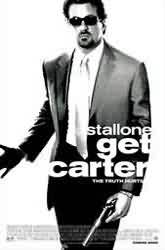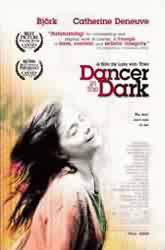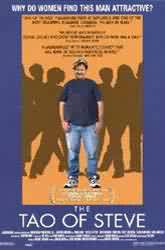 |
Get Carter
(Dir: Stephen T. Kay, Starring Sylvester Stallone, Mickey Rourke, Alan Cumming, Rachael Leigh Cook, Miranda Richardson, Michael Caine, John C, McGinley, Rhona Mitra, Gretchen Mol, and Johnny Strong) BY: DAVID PERRY |
| Cinema-Scene.com > Volume 2 > Number 40 |
Cinema-Scene.com
Volume 2, Number 40
This Week's Reviews: Get Carter, Dancer in the Dark, The Tao of Steve.
This Week's Omissions: Digimon: The Movie, Duets, Love and Sex.
 |
Get Carter
(Dir: Stephen T. Kay, Starring Sylvester Stallone, Mickey Rourke, Alan Cumming, Rachael Leigh Cook, Miranda Richardson, Michael Caine, John C, McGinley, Rhona Mitra, Gretchen Mol, and Johnny Strong) BY: DAVID PERRY |
Just when people can say that Mike Hodges has made a comeback thanks to Croupier, they have to go out and tarnish one of this prior successes with this useless remake. The original Get Carter is a serisous film from a serious time made by serious people. Its style and substance transcend the world of British filmmaking in the 1960's and early 1970's. Get Carter might be a perfect film to sit beside The President's Analyst or Blow Up.
But this film cannot sit in the same country as those films. This Get Carter is one for the MTV generation, who will find its serene action as boring. It tries to recreate the mood of the original by making it sufficiently 1990's Michael Bay. Trust me, Michael Bay is not the ideal man for 1990's filmmaking.
This Jack Carter is played by everyone's favorite destitute washed-out action star, Sylvester Stallone. His Carter is still that hard edged might, but in a much larger build. Not only are people afraid of his talents as a hitman but also by the size of his arms.
Like the original Jack Carter is in his home town in search of the people behind the recent death of his brother. Since this is the year 2000, these villains are internet gurus. Is there such a thing as someone more dastardly than a Bill Gates facsimile?
These are men that not only make trouble in their home town by squandering around in underhanded deals, but also, they run a porn website. Well, strike up the noose and call the vigilantes, these badguys must be dastardly.
The computer programmer millionaire is none other than everyone's favorite Nathan-Lane-come_acceptable Alan Cummings. He is not some maniacle mogal like Jonathan Pryce in The World is Not Enough, but merely a weakling, a cyber-marrionette in the plans of the city's gangland roughian. Did I hear "gangland roughian?" Well, it must be a chance for Mickey Roure to to try comeback number twenty-nine.
Ever hear of style over substance? Well, director Stephen T. Kay, cinematographer Mauro Fiore, and editor Jerry Greenberg attempt to make it scream "style" so loudly that there no room for any substance. The film looks so much like a Guy Ritchie film on acid that it becomes a muddled, unfathomeable mess. There are long scenes that plod on forever and short scenes that stand as pointless.
I'm sure that this is supposed to be a return for Stallone, who is in dire need of a hit after disppearing in the years after his shining moment in Copland. But this is a horrible idea for a comeback. Yes it is free of the normal Stallone requisite explotions, but that does not make him more refreshing. Note to Sly: the reason that you have a career is the humnity in your Rocky performance. Get it, human characters, not over-the-top heroes.
The rest of the cast fall into a stereotype collage. There's the frail widow (Richardson), the disoriented daughter (Cook), the joking cohort (McGinley), the vampish moll (Mol), the rich ubergeek (Cummings), and that ganagland roughian.
Then there's Michael Caine, who played Jack Carter in the
original film. His presence is merely to distaract the viewer as to haw bad the film
is. It's like having Peter O'Toole in Phantoms or Charlton Heston in Alaska
or Walter Matthau in Hanging Up. It seems to me that the act of having good
actors in bad films does not bring prestige, but someone to make the rest of the film seem
worse.

| BUY THIS FILM'S FROM AMAZON.COM |
REVIEWS OF THIS FILM |
 |
Dancer in the Dark (Dir: Lars von Trier, Starring Björk, Catherine Deneuve, David Morse, Peter Stormare, Cara Seymour, Vladan Kostic, Siobhan Fallon, Jean-Marc Barr, Jens Albinus, Vincent Peterson, Reathel Bean, Lars Michael Dinesen, Udo Kier, Joel Grey, and Stellan Skarsgård) BY: DAVID PERRY |
"I think she sings funny and her dancing is not all that great."
That spin on the famous production executive's critique of a young unknown named Fred Astaire certainly holds true for Icelandic pop star Björk in the Lars von Trier film Dancer in the Dark. But she is also compassionate, heart-wrenching, and a damn fine actress.
Björk is Selma, a young Czech woman in 1961 Washington. She immigrated to America in hopes of saving her son from the family disease, a slow turn towards blindness that has nearly completed its toll on her. She spends every hour of her life trying to save the money needed for the operation that will save her son's vision.
Thanks to having memorized the eye chart, she passes the vision test and begins working in a factory with her friend Kathy (Deneuve). She knows of Selma's vision problems but has no idea of the extent that Selma cannot see. But this impediment does not completely kill Selma -- she still has her imaginary musical sequences.
That's right, the lack of vision and the continuous sounds of the presses in the factory create a room and a beat for her daydreaming, which lead to her living a life without the worry of her blindness. As horrible as her life may be, she always has these huge song and dance numbers to turn to. When her near-obsessed suitor (Stormare) tries to keep her from letting her vision wilt away by saying "you've never seen Niagara Falls," she replies "I have seen water -- it's water, that's all."
She and her son Gene (Kostic) live in a trailer outside the home of a seemingly somewhat wealth couple who take care of Gene while Selma toils in the factory. Bill (Morse) is a police officer that has come into money thanks to an inheritance and cannot keep his wife Linda (Seymour) from spending what he has left. He occasionally confides his problems to Selma while she works on her second job, placing hair pins into the packaging, during the late hours of the night.
What all this leads to is both surprising and heart breaking. The world's treatment of Selma is almost sickening. She is like a 1960's version of Joan of Arc or Thomas Hardy's Tess of the d'Urbervilles or Lillian Gish in The Wind -- her story is like that of so many ill-fated female martyrs of history and art. Like a self-sacrificing Pandora, Selma's story brings in the idea of someone's tiniest decisions changing their lives completely. To put it even closer to home, Selma is one of the best female characters since Emily Watson brought us Bess in Breaking the Waves, not surprisingly another film by Lars von Trier (looking back at his telling of Medea in 1987, it is easy to see that he is highly gifted at portraying highly emotional woman on the screen).
Lars von Trier co-founded the Dogme 95 manifesto five years ago and chose to steer slightly away from it this time around. It is not that the look is astray from the manifesto, that is simply von Trier's style, but that creating a grand scale musical tragedy as such would have been nearly impossible if done in the same way as The Celebration, The Idiots, or Mifune. Need we not forget that one of the Dogme rules is a lack of outside music.
Björk is mesmerizing on the screen. I was not really acquainted with the singer/songwriter before screening this film with the exception of catching her terrific closing credits song for Being John Malkovich. Her music, which is incredibly used in the film, strives for the listener through an emotional charge. Her a cappella final song is one of the finest moments in cinema and can grab the audience by their lapels. She asks that the listeners live in her own musical world where workable rhythm comes from the sounds of a train or of sneakers floor or of a steel press, a world where imagery comes from the slightest of beats from the atmosphere, a world that Selma knows all too well.
This film has been the recipient of as much praise as hatred. For every Lisa Schwartzbaum statement of "genius" there's a Jay Carr calling it "sadistic." This is the film that had people booing its finale at Cannes a couple days before it took the top prize, the Palme d'Or (arguably the most sought after award in international cinema). It toys with the emotions at such a high level that one can either let it takes its toll or feel violated by its undeniable grasp. This is a hard film -- one that cannot be taken on a whim. It manipulates every emotional level and does not atone for it. It is up to the viewer whether the film should be rewarded for being so hard-hitting or despised for being so wielding.
This is not your run-of-the-mill musical comedy that
Selma so wants it to be. Dancer in the Dark is like a step into John
Steinbeck's The Grapes of Wrath with the intermittent joy of, say, 42nd
Street (which Selma sees in the theatre with Kathy, who has to describe the screen
for a blind Selma). This film creates joy in what would otherwise be one of the most
depressing films ever made. Perhaps this film is a little sadistic and even a little
pretentious in a way, but that does not keep it from being what it is. Like a fine
opera, the audience is merely here to share the grief of the singing heroine, despite our
hopes for salvation.

| BUY THIS FILM'S FROM AMAZON.COM |
REVIEWS OF THIS FILM |
 |
The Tao of Steve (Dir: Jenniphr Goodman, Starring Donal Logue, Greer Goodman, Kimo Wills, Ayelet Kaznelson, David Aaron Baker, Nina Jaroslaw, John Hines, Shelby Craig, and Craig D. Lafayette) BY: DAVID PERRY |
A "Steve" is someone that has an undeniable charm that can take any woman off her feet. Men would kill to be a "Steve" like Hawaii Five-0's Steve McGarrett or The Six Million Dollar Man's Steve Austin. Then there's the quintessential Steve, Steve McQueen, whose motorcycle run from the Nazis in The Great Escape sums up everything in the idea of a "Steve."
For Dex (Logue) being a "Steve" is a way of life. Every facet of himself is based on the way of life that Steve McQueen et al. has created for him, and he really does enjoy its benefits. In fact, for a mangy obese man, Dex is surprisingly well taken by women. And he thanks this to the great Steve's.
But, like anyone with such an agenda, there must be someone to help him see the error. As he inconspicuously (or at least in his own mind) flirts with Syd (Goodman), a fellow Santa Fe college graduate in town to work for the sets in the Santa Fe Opera, she makes a statement that one of his predecessors Don Giovanni "slept with 1,000 women because he was afraid he would not be loved by one."
And that is the secret to Dex's infatuation with Syd, he may have already touched upon most of his graduating class over the last fourteen years, but she is the real threat to his life long passion. She is what can ruin a "Steve," for he is in love with her and lets it be known -- something that a "Steve" would never do.
There are twists and turns to their love affair, but none of it can really be considered part of what he really wants. While Dex yearns for Syd, he still attempts to be the lithe male that he tutors his young roommate to be. As long as he lets his rules and regulations of keeping a woman in his fingertips, he can never really have Syd in the way he really wants. To give up his "Steve" persona would be sexual suicide, but it would also mean that he could have the one woman that he really loves.
The secret to this film is in its star. Donal Logue is really the driving force, keeping every moment of this film moving at a brisk pace. Like a giant of 1960's comedy like Zero Mostel, Logue knows how to dive in for the laughs head first. Whether he is working to get laid or doing something as mundane as creating a ice cream sundae, Logue takes the audience for every laugh that is there. I can seriously understand why he was singled out by the jury at the Sundance film festival earlier this year to get a special prize for this film.
The screenplay by director Jenniphr Goodman and sister Greer Goodman (yes, the one that plays Syd) based upon the life of Duncan North has a biting tone that is not seen in most of these independent romantic comedies. I get sick hearing another line from Noah Baumbach's typewriter, this screenplay was really refreshing. For many scenes, the entire feeling of the sequence changes within moments. I was reminded of James L. Brooks' As Good As It Gets, where the smallest character concession can reconstruct everything that has happened in the blink of an eye.
There are some flaws that run around in this film (i.e.
Kimo Williams as Dex's young student in "Steve") but what stands is a real heart
warmer. The Tao of Steve, like Wonder Boys and Almost Famous,
is built around the feel good approach to cinema, a grand feeling after seeing some of
this winter's more depressing fare (read: Dancer in the Dark).

| BUY THIS FILM'S FROM AMAZON.COM |
REVIEWS OF THIS FILM |
Reviews by:
David Perry
©2000, Cinema-Scene.com
http://www.cinema-scene.com